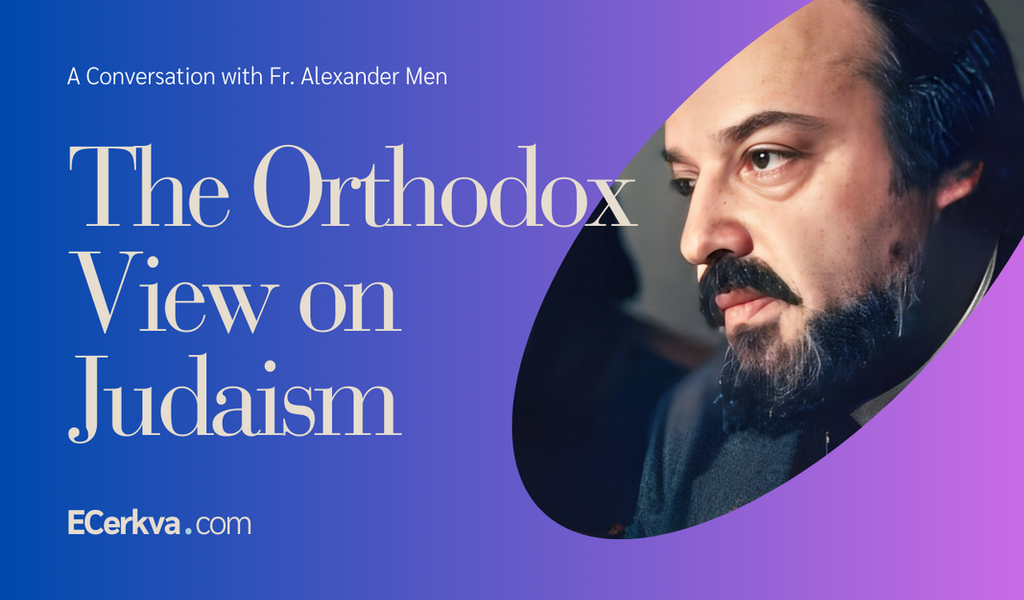What does the Orthodox Church say about Judaism? How does it understand the shared roots and key differences between the two faiths? In this thoughtful and nuanced conversation, renowned Soviet Orthodox priest Fr. Alexander Men offers insight into the historical, theological, and spiritual connections between Christianity and Judaism — while also explaining why the paths of these two religions diverged.
— What is the Orthodox Church’s attitude toward Judaism?
— Judaism is the name we give to a religion that emerged after Christianity, though quite soon after it. There was a single foundation for the three main monotheistic religions: this foundation is called the Old Testament, created within and from the context of ancient Israelite culture. On this basis, late Judaism emerged first — within which Christ was born and the apostles preached. By the end of the 1st century, a religion called Judaism came into being.
What do we, Christians, have in common with this religion? Both they and we recognize the Old Testament — only for us, it's part of the Bible; for them, it's the entire Bible. We have our own canonical books that define church and liturgical life — these are typicons, new canons, church statutes, and so on. Judaism developed similar, but its own, canons. Some coincide with ours, others differ.
There are two main differences between Judaism and Christianity. The first: Christianity is based on the belief that God revealed Himself through Jesus Christ — which was and remains the only and unique salvific act of contact between Heaven and earth. In Judaism, Jesus Christ was, at best, a great teacher of morality and faith, the last of the biblical prophets.
The second difference: Judaism, born from the Old Testament religion, which was almost universal, became a national religion — that is, it regressed into one of the earlier stages of religious development. In antiquity, before the time of Alexander the Great, all religious traditions were identical to national identities. That is, if someone was Greek, they followed the Greek religion because there was no other source of knowledge besides family, city, and community. National religions are relics of that ancient era. For Judaism, this had historical significance because it preserved the identity of the Israelite, the Jewish people. But it lost its universal significance.
— I didn’t quite understand you when you spoke about the foundations of Judaism. After all, that religion is based on the Torah, not the Old Testament.
— As for the Torah, this book is part of the Old Testament and is read in Orthodox Christian churches during every festive service. It is also a foundation of Christianity, including our Orthodoxy, and in some way of Islam as well — because Islam is based on the Bible. Muhammad leaned on the biblical tradition. So, the Torah is a sacred book. In Russian, “Torah” means “teaching.” We refer to it by the Greek tradition — the Pentateuch. These are the first five books of Moses, which open the Bible. Any edition of the Bible begins with the Torah.
— According to Judaism, what qualities must the Messiah possess? And why don’t they accept Christ as the Messiah who has already come?
— Judaism, like Christianity, believes in one supreme Creator, in the idea that history has meaning, and that humans are immortal. Regarding the doctrine of the Messiah — it has taken different forms throughout the history of Judaism, sometimes coming closer to the Christian view, sometimes moving away.
As for why they do not accept Christ — we can only say this: the Old Testament prophecies, as understood in Judaism, spoke of the final stage of history, when the appearance of the Redeemer would transform the universe and lead history along a completely different path. Christ’s coming was a preliminary mystery. He foreshadowed the transformation of the world. When He came to earth, nothing changed outwardly — evil still raged. He came into a dark world. That’s why the Evangelist says: “The light shines in the darkness, and the darkness did not comprehend it.”
To recognize in the person of Jesus of Nazareth the Messiah foretold by the prophets required an act of faith and of thought. It wasn’t easy. I think that modern Jews hold a rather vague and contradictory image of the Messiah.
– How do modern Jewish priests understand the concept of being God’s chosen people? Why do they not recognize the Savior?
– From the biblical point of view, chosenness is a vocation. Every nation has its calling in history; each people has received from God a religious, messianic vocation. And, as the Apostle says, these gifts are irrevocable — that is, this calling remains until the end of history. A person may or may not follow it, may be faithful or betray it — but God's calling does not change.
As for why the Savior was not accepted — that’s not entirely accurate. If the Jews had not accepted Christ, then who would have told us about Him? Who were the ones who wrote the Gospels, the Epistles, who spread the news of Christ across the ancient world? They were also Jews. So some accepted Him, others did not — just as in Russia or in France: for instance, Saint Joan of Arc accepted Him, while Voltaire did not. We also have both Holy Rus and God-fighting Rus. Everywhere there are two poles.

 DE
DE  RU
RU  UK
UK 